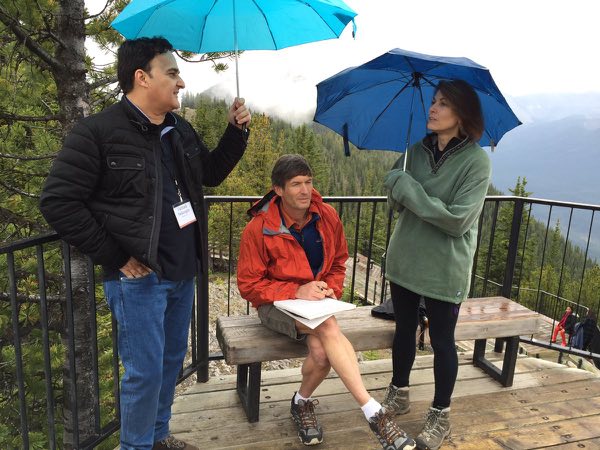Greetings from bucolic Banff, Canada, where we’re finishing up the biennial Foundational Questions Institute conference. To a large extent, this event fulfills the maxim that physicists like to fly to beautiful, exotic locations, and once there they sit in hotel rooms and talk to other physicists. We did manage to sneak out into nature a couple of times, but even there we were tasked with discussing profound questions about the nature of reality. Evidence: here is Steve Giddings, our discussion leader on a trip up the Banff Gondola, being protected from the rain as he courageously took notes on our debate over “What Is an Event?” (My answer: an outdated notion, a relic of our past classical ontologies.)
One fun part of the conference was a “Science Speed-Dating” event, where a few of the scientists and philosophers sat at tables to chat with interested folks who switched tables every twenty minutes. One of the participants was philosopher David Chalmers, who decided to talk about the question of whether we live in a computer simulation. You probably heard about this idea long ago, but public discussion of the possibility was recently re-ignited when Elon Musk came out as an advocate.
At David’s table, one of the younger audience members raised a good point: even simulated civilizations will have the ability to run simulations of their own. But a simulated civilization won’t have access to as much computing power as the one that is simulating it, so the lower-level sims will necessarily have lower resolution. No matter how powerful the top-level civilization might be, there will be a bottom level that doesn’t actually have the ability to run realistic civilizations at all.
This raises a conundrum, I suggest, for the standard simulation argument — i.e. not only the offhand suggestion “maybe we live in a simulation,” but the positive assertion that we probably do. Here is one version of that argument:
- We can easily imagine creating many simulated civilizations.
- Things that are that easy to imagine are likely to happen, at least somewhere in the universe.
- Therefore, there are probably many civilizations being simulated within the lifetime of our universe. Enough that there are many more simulated people than people like us.
- Likewise, it is easy to imagine that our universe is just one of a large number of universes being simulated by a higher civilization.
- Given a meta-universe with many observers (perhaps of some specified type), we should assume we are typical within the set of all such observers.
- A typical observer is likely to be in one of the simulations (at some level), rather than a member of the top-level civilization.
- Therefore, we probably live in a simulation.
Of course one is welcome to poke holes in any of the steps of this argument. But let’s for the moment imagine that we accept them. And let’s add the observation that the hierarchy of simulations eventually bottoms out, at a set of sims that don’t themselves have the ability to perform effective simulations. Given the above logic, including the idea that civilizations that have the ability to construct simulations usually construct many of them, we inevitably conclude:
- We probably live in the lowest-level simulation, the one without an ability to perform effective simulations. That’s where the vast majority of observers are to be found.
Hopefully the conundrum is clear. The argument started with the premise that it wasn’t that hard to imagine simulating a civilization — but the conclusion is that we shouldn’t be able to do that at all. This is a contradiction, therefore one of the premises must be false.
This isn’t such an unusual outcome in these quasi-anthropic “we are typical observers” kinds of arguments. The measure on all such observers often gets concentrated on some particular subset of the distribution, which might not look like we look at all. In multiverse cosmology this shows up as the “youngness paradox.”
Personally I think that premise 1. (it’s easy to perform simulations) is a bit questionable, and premise 5. (we should assume we are typical observers) is more or less completely without justification. If we know that we are members of some very homogeneous ensemble, where every member is basically the same, then by all means typicality is a sensible assumption. But when ensembles are highly heterogeneous, and we actually know something about our specific situation, there’s no reason to assume we are typical. As James Hartle and Mark Srednicki have pointed out, that’s a fake kind of humility — by asserting that “we are typical” in the multiverse, we’re actually claiming that “typical observers are like us.” Who’s to say that is true?
I highly doubt this is an original argument, so probably simulation cognoscenti have debated it back and forth, and likely there are standard responses. But it illustrates the trickiness of reasoning about who we are in a very big cosmos.

Sean, I don’t buy the simulation argument, but I think your response misses the mark. Bostrom’s argument would imply not so much lower resolution simulations, as briefer simulations, in levels with less computing power. The bottom level civilizations would look like they are on their way to becoming advanced enough to simulate civilizations – until the gods of their universe flicked the off switch. Hat tip: slatestarcodex blog.
We probably slip back and forth between a simulated world and our universe all the time in order to prevent temporal paradox’s. Then it is all ran by a machine almost un-calculable in size which exist in hyperspace, which sole purpose is to duplicate every temporal universe to exist in its own image. Then we are forced to live our lives over and over almost exactly the same as we did in this “alpha universe” of the temporal war ran by some religious fanatics. By this line of reasoning, we are the alpha universe or I should really start writing science fiction…